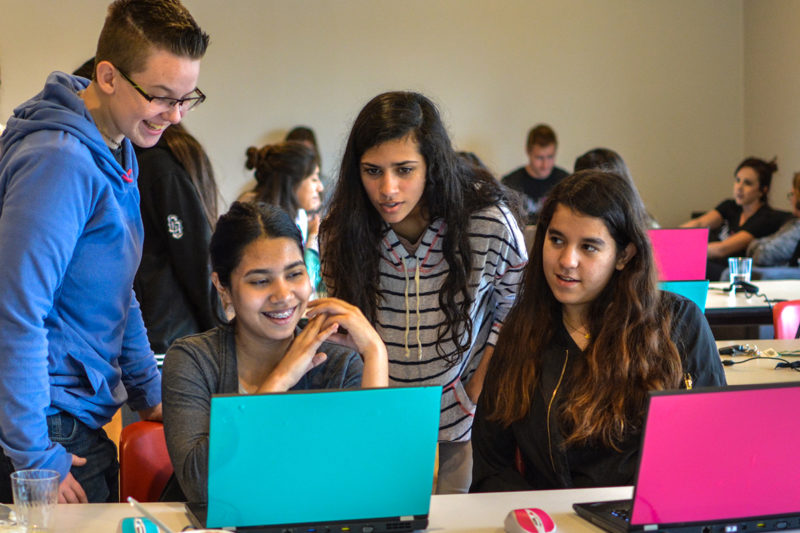Nonprofit Provides Channels Into Technology for High School Girls
By Katherine Heighway
Reporting Texas

Participants at a recent ChickTech workshop held in a local event space. The nonprofit helps young women focus on technology and science. Ashley Ephraim/ Reporting Texas
Building computers, making films, visualizing data and visiting tech workers on the job are among the ways ChickTech, a national nonprofit organization, helps Central Texas females in high school get into technology professions now dominated by males.
“The mission is to get girls out into the world of technology,” Nicole Engard, director of ChickTech Austin, said in a telephone interview, and encourage them to think about pursuing careers there.
ChickTech’s main driver is a series of monthly workshops in which high school girls learn new skills such as web design or visit companies such as Google and IBM that work in so-called STEM fields–science, technology, engineering and mathematics.
Sabrina Carrillo, 17-year-old junior at Round Rock High School, joined ChickTech’s Austin program this year because of her interest in health technology.
“You meet people from different types of jobs, and it’s a great experience to get that exposure to see what I would want to do as a career,” Carrillo said in a telephone interview.
Just 26 percent of U.S. employees working with computer systems are women, down from 35 percent in 1990, according to a 2015 study by the American Association of University Women, a nonprofit that promotes gender equality. The study noted that women often feel isolated in engineering and computer science careers, and experience lower job satisfaction in STEM careers.
ChickTech’s Engard works full-time as a content strategist for Red Hat, a company that provides open-source software. Of the 15 women who run ChickTech’s Austin chapter, all are volunteers. Many have jobs in STEM-related fields.
Engard hadn’t heard of ChickTech until she came across the organization’s booth in 2015 at a software convention in Portland, so she helped start the local chapter.
For Maxine Ramirez, high school program manager for ChickTech in Austin, opening a chapter here made sense because of the city’s sizeable tech community. “There [are] other great organizations like Girls Who Code … but they all serve different functions,” said Ramirez, 32. “Ours is specifically [focused] on high school girls … that wouldn’t necessarily have access to some of these different types of technologies and getting their feet wet in them.”
Janice Levenhagen-Seeley started the organization in Portland in 2012 with five volunteers. Today she works as CEO at ChickTech, which maintains a small staff at its Portland headquarters. There are 14 chapters nationwide that have between 1,500 and 2,000 volunteers.
ChickTech’s revenue comes mostly from corporate donations and conferences, with Adobe Foundation and CDK Global as the largest sponsors, Levenhagen-Seeley said in a telephone interview. This year, the company’s revenue hit $1 million, with the bulk of the money going into ChickTech events, she said.
“The goal when I first started was about providing opportunities for women, and it still is,” said Levenhagen-Seeley. “But over the years, I’m almost using that as a platform to build community for girls and women, and working towards gender equality.
Levenhagen-Seely left her job as a computer engineer to pursue ChickTech, which she said “made me feel like I could affect change.”
“When I was in the tech industry I felt so powerless and that I couldn’t change it so I had to leave,” she said.
In Austin, ChickTech has found an enthusiastic welcome. “Typically when a chapter starts, they don’t get more than 100 nominations, and we got 330 nominations [for year one], which is astronomical for us,” Ramirez said.
Students from 19 high schools and one home-schooled student participated this year in the Austin area. Lake Travis High School and McNeil High School both had 13 students participate, the most of all of the schools, Engard said. The Austin Independent School District doesn’t participate in ChickTech.
The percentage of students who felt “confident” or “very confident” in their skills in technology increased to 74 percent from 27 percent after the ChickTech’s high school program in 2015, according to ChickTech’s website.
Dawn Kidd, a 55-year-old math teacher at the Texas School for the Deaf, attended one of the Austin chapter’s workshops at IBM in Austin. Two deaf IBM employees visited with the two students from the school whom Kidd nominated to be in the program.
“It was a really great experience for my students to see they were deaf adults out working at IBM, and they were excellent role models,” Kidd said in a telephone interview. “They talked to our girls about college and things they might do if they were interested in certain fields of STEM study.”
Geeta Shukla, 31-year-old mentorship program co-manager at ChickTech, said in a telephone interview that as the program goes forward, the organization wants to focus on schools that have less funding. “This last year we met a lot of girls from charter schools, and they didn’t necessarily have access to the same resources [as public schools],” Shukla said.
Levenhagen-Seeley said that the ChickTech plans to expand to 24 cities by the end of June, including Detroit, Denver, Los Angeles and Phoenix.
This article has been corrected. Github is not among the companies ChickTech students visited. The ChickTech convention was held in Portland, not Austin. Percentages cited regarding improvement in technology confidence are for the entire year of 2015, not one weekend.